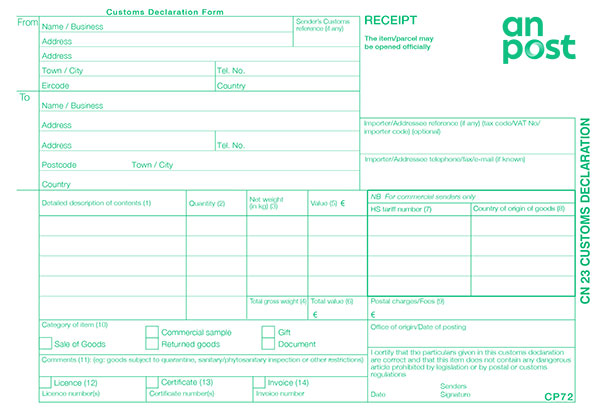Sending outside the EU
Receiving country requirements
All items (including gifts) posted from the Republic of Ireland to a country outside the European Union (including Great Britain) must be presented to the Customs authorities in the receiving country.
Irish Customs requirements
If you export goods to non-EU countries (including Great Britain), An Post may need to complete a customs declaration on your behalf. This is known as Advanced Electronic Data (AED). This customs declaration must be made electronically through Revenue’s Automated Export System (AES). The corresponding CN23 label must be affixed when sending good(s) of any size or value to non-EU countries.
The following documents must be available, if requested by Revenue at the time of clearing your goods:
•Invoice
•Export licence
Please ensure any good(s) sent are not prohibited or restricted for air travel.
If you send good(s) to non-EU countries, you must provide the following electronic customs data:
•Senders name, address and contact details
•The name and address of the recipient
•A detailed description of the contents of the item(s)
•Quantity / Number of Units
•Net Weight
•Value of the item/contents
•Category of the item(s)
•Reason for Export
•Postage / shipping cost
Insufficient data may result in the item being returned to the sender, if rejected by the receiving Customs authorities.
Data may also be shared by An Post with Irish Revenue when it is appropriate and necessary to do so, i.e., for consignments above €1000 or subject to prohibitions and restrictions.
-4.jpg)
How do I provide electronic customs data?
You can provide AED at your local post office counter or using Click & Post, by populating a CN23 international customs label. If you are an eCommerce Hub user, you can also generate AED using the eCommerce Hub platform by populating a CN23 international customs label or similar White Label applications. This label must be affixed when sending good(s) of any size or value to non-EU countries.
Send with Click & Post
An online version of the form can also be completed when you Click & Post online.
Prohibited items
Some items are prohibited for sending, you can see the full list of items that are prohibited when sending to non-EU countries on our prohibited items list.
Taric codes
When sending goods non-EU countries, you will need to assign a TARIC code to your customs declaration for the receiving customs body to process your goods correctly. This may also be referred to as a Harmonisation code, a Tariff code or a Commodity code.
Using our online TARIC code tool you can identify the correct TARIC code for your items.
If you are sending more than 2,000 items annually, please contact our team and a member of our team will be in contact regarding International sending solutions.


